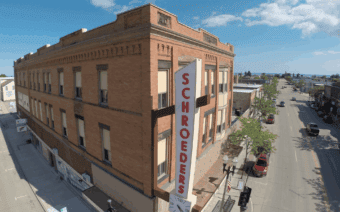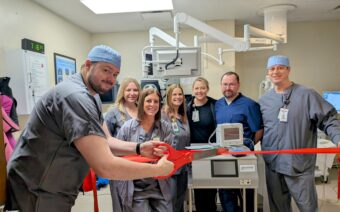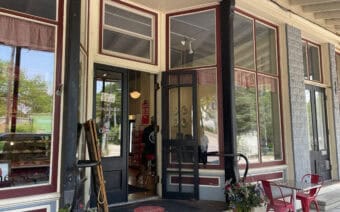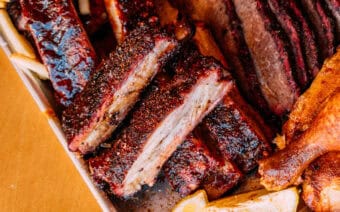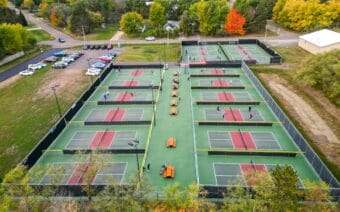February 19, 2024
CHIPPEWA FALLS – The Wisconsin Farmers Union (WFU) – a nonprofit organization that supports small- and medium-sized farms across the state – is preparing to move from its location at 117 W. Spring St. to 128 W. River St., better known to the people of downtown Chippewa Falls as Market on River (MOR).
The move, Jackie Boos, facility director at WFU, said comes from a need to expand from its current location – and a desire to become more known throughout the community.
“To make sure we’re putting ourselves in an area that was grassroots marketing (and) letting the general public know who we are,” she said. “Even though we’ve been here, they might not always see us.”
Boos said WFU has been at its current location since the mid-1950s.
“As time has changed, our staff has changed and grown, she said. “Our team needs have grown”
The new building comes with a history of its own, originally founded as Chippewa Valley Mercantile 120 years ago and is known as a “representative of an early wholesale, commercial enterprise,” according to the Wisconsin Historical Society.
Though the organization travels to its members all over the state, Boos said remaining based in Chippewa Falls “was a top priority.”
MOR, she said, will bring much higher visibility to WFU – and will also highlight local businesses, with its first and second floors offering tenant space.
“We knew having such high visibility now for our organization would not only strengthen what we’re doing on a day-to-day (basis), but it also strengthens our common neighbors to know what we’re doing,” she said.
Boos said MOR’s 45,000 square feet will be divided amongst three floors:
- The first floor will feature a food hall
- The second floor will house WFU’s headquarters and offer tenant space
- The third floor will offer residential living.
First floor – food hall
Boos said each floor of the MOR building fulfills a different purpose.
The first floor food hall, she said, “is going to be our attraction point.”
“Anybody can come in and have a variety of menus offered to them from multiple small LLC restaurants,” she said.
As of now, Boos said WFU currently has contracts with:
- TemptAsians (Vietnamese)
- Ne-Ne’s Tacos (Mexican)
- Big Papa BBQ (barbecue)
- Whirlybird Coffee Co. (coffee/mocktails)
All restaurants that work within MOR, Boos said, become Wisconsin Farmers Union members, “which is an extremely low cost to them for the full year.”
There are two open kitchen areas that she said “have high demand on tours right now.”
“We have a Greek restaurant potentially interested,” she said. “And we have a pizza and sandwich restaurant that’s interested.”
Neither eatery had committed at press time.
Throughout the process of contracting with the restaurants, Boos said it was important to WUF that the space highlighted minority business owners and women business owners.
“We naturally and organically have done that with those that have contracted with us,” she said. “We’re excited about that.”
To keep to WFU’s mission of supporting farmers, Boos said vendors are required to purchase at least 15% of their produce, meat and other food needs from a Wisconsin Farmers Union farmer.
“We are practicing what we preach as far as purchasing local, know your farmer, know where your food comes (from),” she said. “We’ll be able to market and tell that story of where the eggs came from, and how many miles did the meat come from… People are more conscious about where their food comes from, and so for us to play into that and also support our farmers is what we set out to do for the first floor.”
Having a common space between the restaurants, Boos said, will also help with the employee shortage many restaurants have been facing since the COVID-19 pandemic, which she said has “almost been a sigh of relief” to some of the local business owners.
“In the restaurant sector, they’re getting hit hard post-pandemic,” she said. “They are strapped for employees… What this model allows for them to do, is they have a smaller space they have to commit to, but they don’t worry about clearing tables or cleaning restrooms or their own individualized garbage. It’s set up as a communal space, so we’ll have a team that tends to the area… so they (can) focus on behind-the-counter stuff.”
In addition to the restaurants, Boos said WFU is also working toward adding a community kitchen, as “there is nothing like that in our area.”
“Our hope with the community kitchen is to introduce education and evenings and also give some of the entrepreneurial, spirited people the opportunity to come in and do some cooking, create what they do… and then they go out to other markets to sell,” she said.
Second floor – headquarters and more
WFU’s headquarters will be housed on the building’s second floor, though Boos said it will only be taking up “about 45%” of the space.
“(The meeting space within the headquarters), can be used for a lot of different meeting needs, social events (education and more),” she said.
Boos said WFU owns Kamp Kenwood on Lake Wissota, which can also be used as a meeting space, but it didn’t completely meet the organization’s needs – most notably it wasn’t accessible year-round.
“It’s not four seasons,” she said. “It didn’t allow us to (always) have on-site meetings or advance our education opportunities.”
The new, larger WFU space, she said, will also allow the organization to continue its mission.
“The idea is when we physically grow our building, our organization grows in membership and awareness,” she said.
Boos said the second floor will also have about 2,600 square feet that can be used as tenant space for local businesses.
“These would be independent LLCs that would come in and have their nine-to-five type businesses,” she said. “We have a salon that’s already booked a space up there, and we hope it will continue the excitement and get some new people in the space.”
Third floor – residential
The third floor, Boos said, aims to help fulfill a need in Chippewa Falls – housing.
Though the city has a mixture of residential homes that were built around the time it was incorporated, Boos said “we didn’t have a lot of opportunity for that working sector apartment, or maybe the retiree who wants to have downtown living.
The third level will have nine residential units, ranging from 770 square feet to 2,300 square feet.
“(It is) really the first of its kind in Chippewa Falls right now,” she said. “We took a lot of time to figure out the best layouts, utilizing that this building overlooks the Chippewa River. Our working professionals – those are the people that were missing. So for us, it’s a way to start playing and to show the working young professionals – all scale really – that they’ve got an option to live downtown.”
Community support, benefits
With businesses, such as Jacob Leinenkugel Brewing Company and the Heyde Center for the Arts in Chippewa Falls, Boos said Market on River is “adding to the amazing inventory that’s already here.”
“We hope we write ourselves into the foodie category (and) that destination category – and, again, put Chippewa Falls on the map in certain areas we might not have been before,” she said.
Though MOR is a project of the WFU, Boos said “we’re not doing this alone.”
The project, she said, has received help from the community – including:
- A RDA (rural development advance) loan (or TIF) from the City of Chippewa Falls
- A grant from the Wisconsin Economic Development Corporation
- A façade grant from the Regional Business Fund, Inc., which is administered by the West Central Wisconsin Regional Planning Commission.
“We feel supported in this, and we feel responsible as well for what we’re doing and how we’re creating the next chapter,” she said.
The building’s renovations, Boos said, has also created close to 60 jobs for the duration of the project.
“It comes to the trickle-down economics of everything,” she said. “What we’re building here, in its construction phase, then move over to our normal operations, (which) will then also allow for these smaller LLCs to stay in business.”
And, while continuing to build up the Chippewa Falls community, Boos said MOR will allow for the Wisconsin Farmers Union to continue to fulfill its mission of uplifting its members.
“We hope that, with our visibility, not only will that allow for more reach and more member interaction, but it also gets us at a different table to speak the policy truths and how we support and fight the injustices that are done to small farmers and our members as well,” she said.
“What we’re doing impacts every single person because every single person eats.”
To learn more about the Wisconsin Farmers Union or Market on River, visit wisconsinfarmersunion.com.
 Popping its way to success in North Central Wisconsin
Popping its way to success in North Central Wisconsin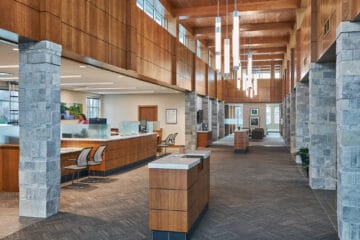 Bank First earns accolades from Forbes, customers alike
Bank First earns accolades from Forbes, customers alike


